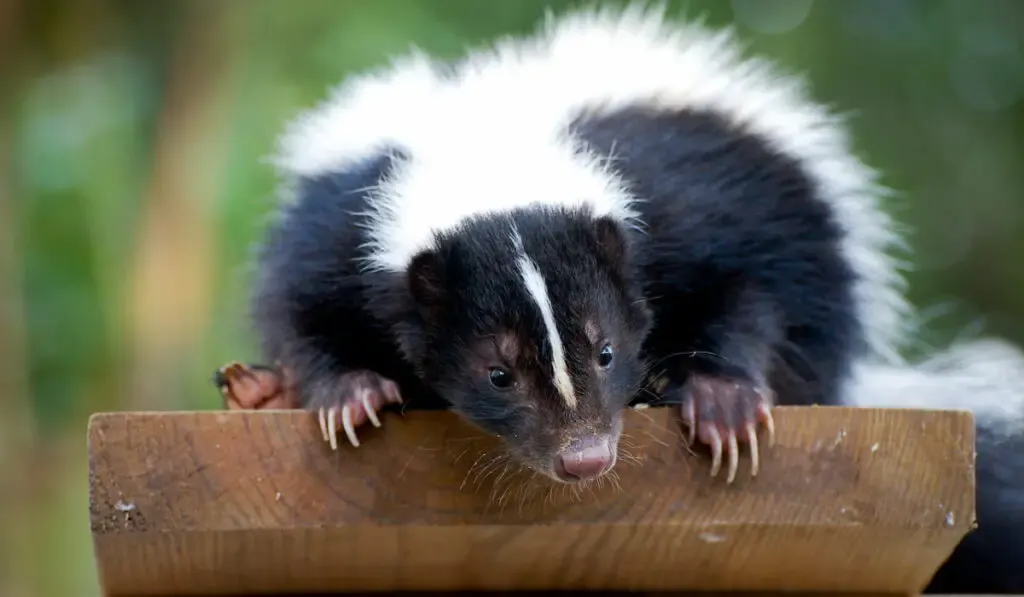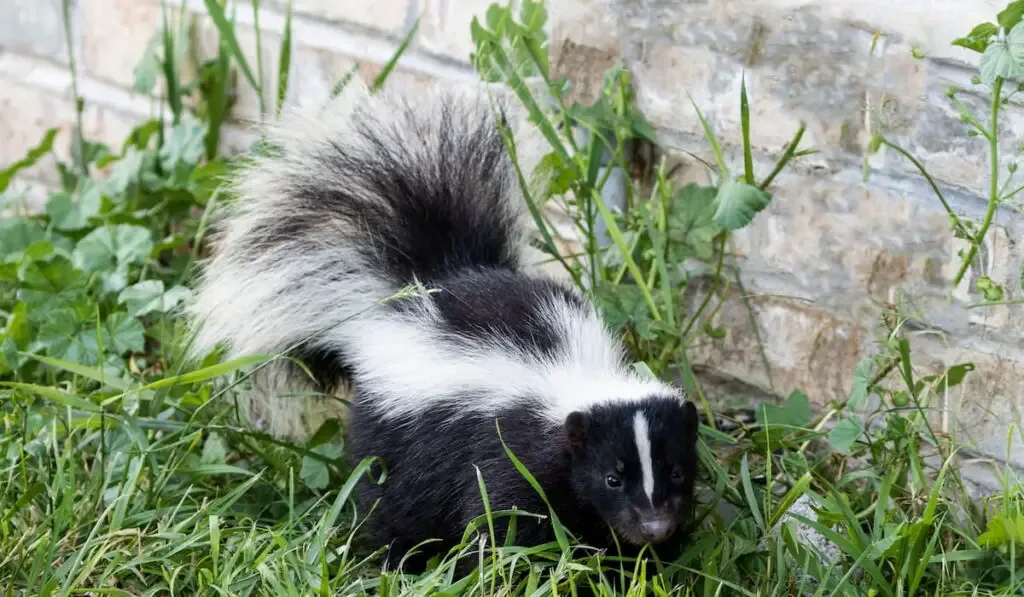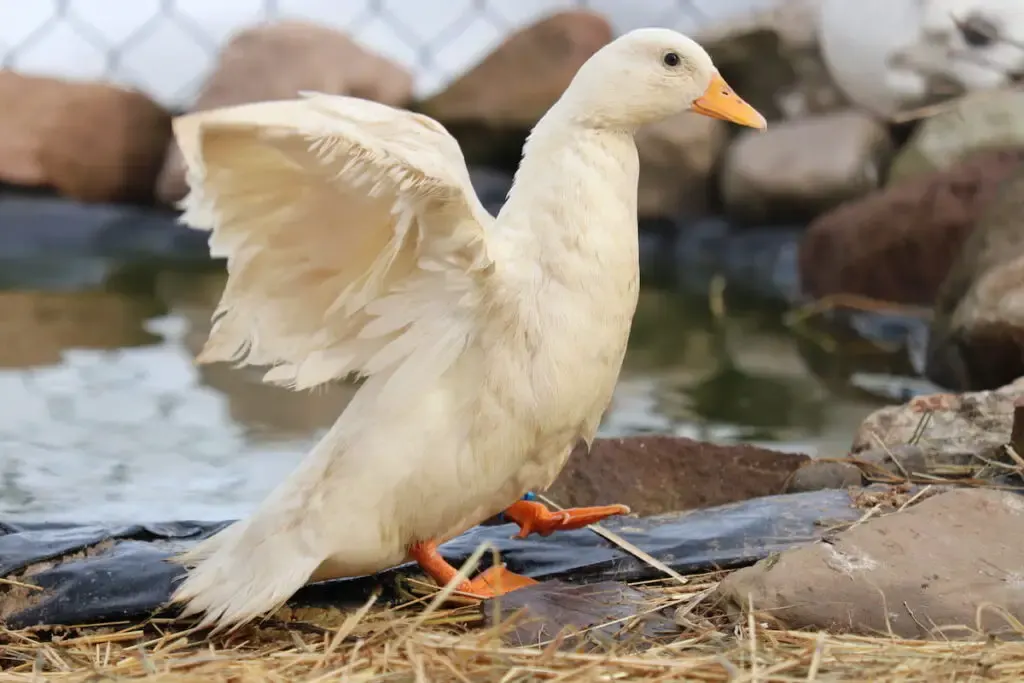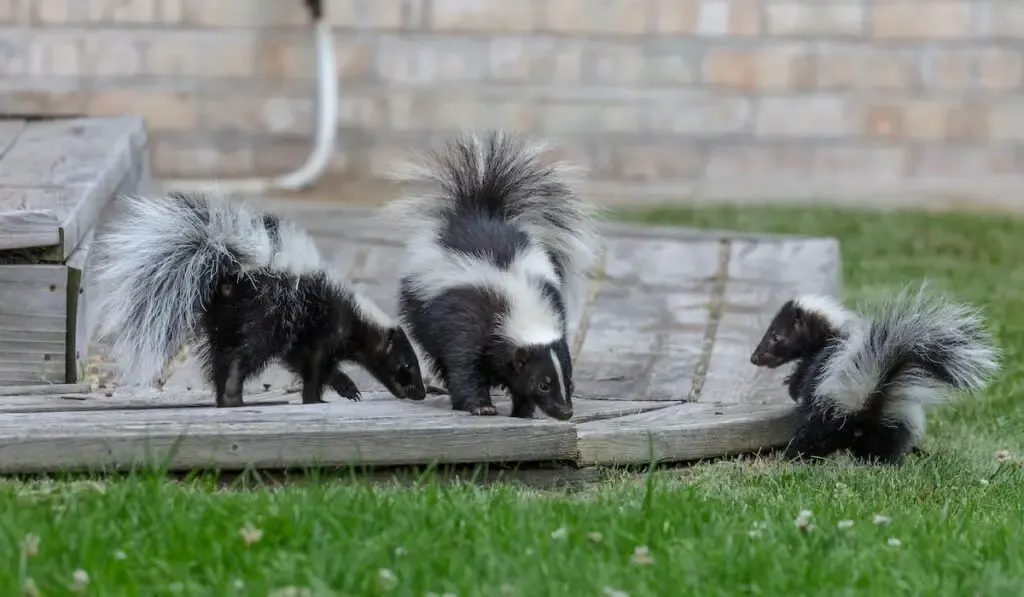We’ve all either seen or heard of these furry stink bombs. You may have personal experience with a run-in from a skunk, heard stories, or seen it in the media.
Regardless of whether your first time smelling a skunk’s spray was driving past a smelly spot of the road or first-hand experience of being sprayed, you know of the danger of this animal’s stink sprayers and to avoid a hideous smell explosion.
But sometimes skunks won’t keep their distance from you. There are multiple reasons, really. As you know, skunks are native across North America and parts of South America too (essentially the Western Hemisphere). So, odds are there are some living in your area.
Skunks are solitary creatures and typically avoid contact with humans, but there are times when they choose to live nearby.
For example, if you are a farmer and have animals all nice and rounded up for them, they will move in for easy meals.
Will skunks eat ducks?
Skunks will indeed eat ducks and other poultry. That’s right, these animals eat meat, and they’ll eat your farm animals if you’re not careful! Read on to learn more about skunk habits and what they eat.

Table of Contents
Why Would a Skunk Be Living Close to Me?
Skunks are naturally found in all types of terrain, from forests to deserts to mountainous regions depending on the species of skunk.
The stereotypical black skunk with a white V down its back is found from Southern Canada, throughout the states, and down to Mexico, often in forested regions. Hooded skunks, named for their whole top half being a thick white mane from their head down their back and a thick ruff that looks like a hood, are found mostly in the Southwestern part of America, in deserts, mountainous and forested areas.
Next, the spotted skunk, which has strange squiggly white markings on its black fur instead of uniform lines, is found in southern Canada, America, and even down in Costa Rica! They inhabit forested and desert areas.
Finally, there are the hog-nosed skunks, appropriately named for the pig-like snout they have instead of a little black nose, and with their top fur a shade of brown in between the lines instead of black like the rest of its body. These little smelly piggies (the smelliest pigs of all!) live in North and South America in both hot desert climates and the changing seasons of deciduous forests.
So, all species of skunk can live in all types of terrain across the Western part of the globe. This means there could be many living in a closer range to your person than you think.
Okay, but what about within that range? Why would the skunks native to my area be living close to my house?

Well, a couple of reasons. Skunks reside in little burrows, either found or built themselves. They’ll live in little pockets of enclosed space, like a hollow log or tree, a small cave, or dig a burrow in the dirt. Or–and this is where you come in–in man-made burrow options such as under porches or decks.
You may have a skunk living under your barbeque without even knowing it! They love dark enclosed spaces, and when they find the space under your porch they will think it is the perfect spot to nest.
Aren’t there better options than under my porch? What would motivate them to live there specifically?
The other reason they may choose to live so close to your home is the access to nourishment. Skunks, naturally, need food and water and they may be able to get it more conveniently rooming with you.
For example, if you have a pond on your property, it gives them easy access to water. Skunks always choose homes close to water sources. The other reason may be if you possess animals or plants that they like to eat, and living so close will make hunting and feeding themselves quick and simple.
What Do Skunks Eat? How Many of My Animals Should I Look Out For?
Skunks are omnivores. They eat both plants (both vegetables and fruit), and animals.
If you are a farmer and have vast planting fields and chicken coops and rabbit habitats and such, or if you simply have a garden and maybe some chickens, you will be a prime skunk target.
Skunks eat vegetables more in the winter because prey is scarce. Skunks rarely hibernate, but many other mammals do, including a lot of their prey. So, they stick to the roots and leaves of trees and plants, nuts, or, if they have access, fruit such as grapes, cherries, and berries.
Once spring hits and all the animals emerge, skunks can resume the hunt. Skunks are not picky; they’ll eat a wide variety of creatures, from bugs to amphibians to mammals! But the mammals are the ones you’ll most likely want to be protective of.
Skunks will eat bees (yes, bees, so if you’re a bee farmer, beware!), spiders, grasshoppers, beetles, and crickets. They eat frogs, toads, and newts. They eat fish, so if you have a koi pond or are fond of the fish in your property’s pond, add them to your list.
Skunks will eat rodents and small mammals, including rabbits and mice (rabbits are a must-watch around skunks!). And finally, skunks love to eat birds. The best birds are the ones that nest on the ground, as they are the easiest to hunt and catch– which includes your beloved chickens! If you suspect to have a skunk living nearby, take extra care in monitoring and protecting your chicken coops and rabbit cages.

I Have Ducks in the Pond at My Farm. Should I Be Worried Our Resident Skunk Will Kill Them?
Yes. That sounded very ominous, but it’s true. Skunks eat birds who nest on the ground, which includes ducks and ducklings. If you have a duck house near your pond, add it to your rounds when taking the measures needed to ensure that no skunks can get to them.
One factor to consider when preparing is that skunks are nocturnal. They don’t necessarily sleep all day, but they are much more vulnerable in daylight to predators, so they spend most of their day hiding and preserving strength.
They are most active at night and will begin hunting in the early evening. That’s when most of their prey is sleeping, and they can use the cover of darkness to sneak in and attack. Ducks are often taken by skunks around seven to nine o’clock at night.
How Do I Avoid These Attacks? What Steps Need I Take?
There are safety measures you can install to your animal enclosures to keep them safe from not just skunks, but other furry predators and even winged ones, too.
First, you can put a safety net around your enclosure. Around your chicken coop, build scaffolding walls until there are four walls around the coop. Then, instead of filling the space between the wood with sheetrock like in homes, fill it with netting. This will allow fresh air, sightlines, and sunlight for your chickens, but should keep any predators out.
Keep in mind that these mammals are hungry, and have all night to pick around and find the weak spot in the netting. So, make sure that you can put a lot of pressure (or even stand!) on the netting without it breaking to know that it is firm enough to keep your birds safe.

Speaking of birds, to keep out any aerial attacks on your pets, complete the enclosure around the chicken coop with a solid roof (no netting!) Often birds such as hawks can simply dive-bomb the coop and make off with one of your chickens, but this way it won’t be able to see or get to them.
If your resident skunk is out there right now attacking your animals, read this! Don’t take the gun out; a simple broom or long pole will do (to keep your distance). Go to where the skunk is, and use the end of the stick to separate it from the prey.
This is a much less harmful, yet still effective, way to save your animals without endangering them with the threat of a bullet. You may accidentally hit them instead of the skunk, and all you’ve done is made the skunk’s job easier.
Make sure to keep a distance, because the skunk may try to attack you, but more likely would spray that horrible odor that no one wants to ever be sprayed with, and you can run out of the way much more effectively from a berth of six feet!
Just like COVID: six feet apart from skunks at all times! Hopefully, skunks never find out how wary we are of them, or else we’re in for big trouble! And a big stink!
